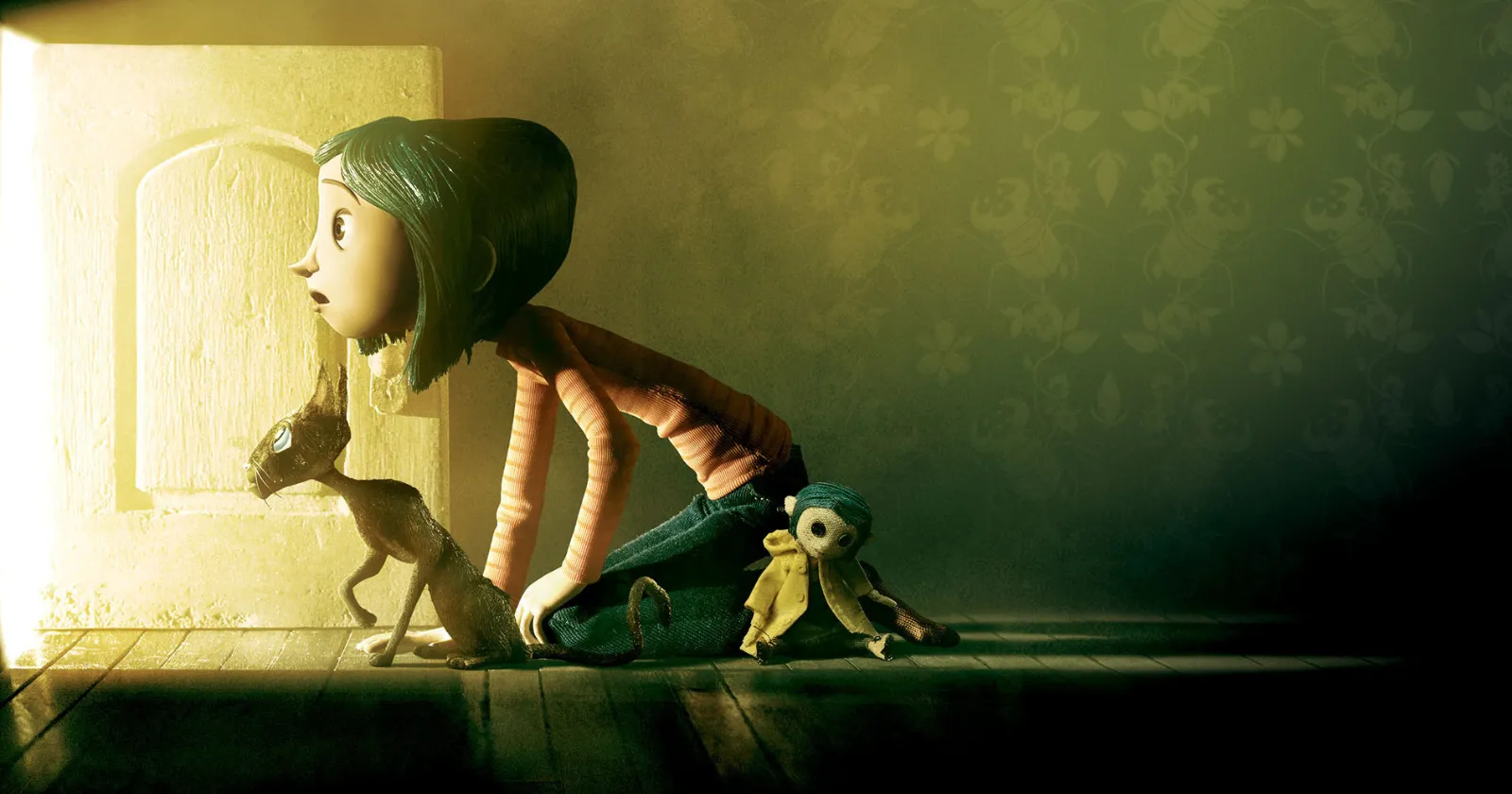An absolutely beautiful stop-motion movie, Coraline supplies enough whimsical joy for kids, while still being thoughtful and profound. Henry Selick‘s best film is also Laika Entertainment’s best film.

Coraline is the fourth movie directed by Henry Selick and was released in 2009. It’s also the second film to be released under the Laika Entertainment banner, which has become the most prestigious stop-motion animation studio of the last twenty years.
Coraline serves as a landmark animated film for several reasons. The stop-motion animation is frankly astounding, feeling like the perfect hybrid of gothic imagery and childlike wonder. Director Henry Selick lives in this space, but Coraline is the most expansive iteration of his agenda – managing to spook children’s imaginations while still pulling them in with fantastic imagery.
And I know this because I was the perfect age to see Coraline when it was released in 2009. I was nine years old, just beginning to understand the oddities and perplexities that came with watching movies just outside my comfort zone. This was around the same time that Fantastic Mr. Fox came out, which essentially had the same profound effect on me, although that film offered a significantly less amount of nightmare fuel (unless you consider how the foxes eat pancakes, which is certifiably deranged).
They were auteur projects in a genre meant for children – you could feel the artist’s thumbprints on every frame of the image, either physically or emotionally. Coraline was the spiritual successor to The Nightmare Before Christmas the same way Fantastic Mr. Fox was the spiritual successor to Wes Anderson’s signature aesthetic of Rushmore and The Royal Tenenbaums.
And the best part of experiencing these movies as a kid is you can feel the intentionality with every fleeting scene, from Coraline strolling through her family’s dying guardian to crawling through the luminating portal for the first time. There’s an aspect of Coraline that you can comment on at all times, a fascination that stops me from accepting typical animated films as being “just for children.” These movies can be more ambitious, as long as they put in the same effort as Coraline does.
Or maybe I just fancy stop-motion over the cutesy style that largely looms over animated movies today. It’s been a recent revelation of mine, that many of my favorite films in this genre take on the form of stop-motion. From Coraline to the aforementioned Fantastic Mr. Fox to Charlie Kaufman’s Anomalisa to even other Laika releases like Kubo and the Two Strings. This seems to be where the zeitgeist is right now for the genre, and I couldn’t be any happier if that’s the case.
But there’s much more to Coraline beyond spooky shots and incredible craft. The voice acting is pretty fantastic across the board, from Dakota Fanning’s tomcat-ish turn as the titular character, to her parents’ dual personas being effortlessly assembled by Teri Hatcher and John Hodgman. I can’t conjure one instance where the movie faulters because of the talented work accomplished by the voice casting.
There’s also a remarkably dense narrative to Coraline, with thematic weight being held by the title character’s choice between returning to her less-than-attentive parents or staying in façade that is button-land. Upon rewatch, the movie is surprisingly successful at conveying the notion that children should be happy with what they’re given, and they should remember what’s truly important growing up.
READ MORE MOVIE REVIEWS: Polytechnique, WALL-E, The Curious Case of Benjamin Button
It’s odd how effective that message is, given that it coincides with a villain that threatens to replace Coraline’s eyes with buttons. Henry Selick pairs tone and theme very effectively in Coraline, managing to make a film that is as rewarding for its purpose as it is its visual feast.
To this day, I still think Coraline is a nearly perfect movie by Henry Selick. It’s ghoulish and daring, while also feeling monumental as an achievement in craft. Movies like this feel unique because they reach an intended audience that just maybe shouldn’t be seeing them yet. There’s an edge to Coraline, one that doesn’t wear off over a decade later.
Score: 9/10
Coraline (2009)
- Voice Cast: Dakota Fanning, Teri Hatcher, John Hodgman, Robert Bailey Jr., Jennifer Saunders, Dawn French, Keith David, Ian McShane
- Director: Henry Selick
- Genre: Animation, Family
- Runtime: 100 minutes
- Rated: PG
- Release Date: February 6, 2009
- Movies Like Coraline: Memoir of a Snail, Guillermo del Toro’s Pinocchio, Puss in Boots: The Last Wish, More Movies Like Coraline
More Reviews for Movies Directed by Henry Selick
Cinephile Corner has reviewed the following movies directed by Henry Selick:
- Coraline (2009)
- Wendell & Wild (2022)